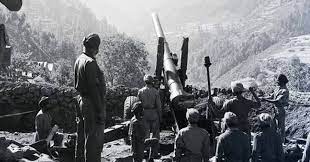

invasion of Kashmir
<p>
To settle matters, Pakistan has always used non-state actors and utilized power that flows from the barrel of a gun. Way back on October 22, 1947, Pakistan first unleashed tribesmen from the North West Frontier Province (NWFP) along with its army to foist a brutal war on the people of Jammu and Kashmir (J&amp;K). For decades Pakistan termed the Kashmir invasion as a spontaneous attack by its people and managed to camouflage the military planning and State role in a brutal invasion.</p>
<p>
However, the surfacing of a book by Pakistani soldier, Maj-Gen Akbar Khan, Raiders of Kashmir, details the meticulous planning behind the Kashmir invasion. It was first published in 1970 in Pakistan. Despite documentary evidence, India has been lethargic in tackling the successful Pakistani propaganda over Kashmir all these seven decades. Just nine weeks after the brutal Partition on religious lines, India had to fight back tribesmen, marshaled by Pakistani Army officers, to save J&amp;amp;K from Pakistan&#39;s tribal militia. In their bid to take over J&amp;amp;K, the attackers had indulged in rampant massacre, rape and looting across all towns that fell on their way from Pakistan till Srinagar&mdash;the capital of Kashmir.</p>
<p>
The attack on J&amp;amp;K happened after the Maharaja of Kashmir, Hari Singh, decided to remain independent of both India and Pakistan. The leaders of both countries tried to persuade him to join them but the Maharaja was convinced about his decision. Though still a new State, carved out of India, Pakistan decided to take unilateral military action and launched a war against Kashmir with its army aided by tribesmen. The Maharaja&#39;s troops were overwhelmed as many deserted his army on communal lines and joined the tribal raiders.</p>
<p>
Finally, the Maharaja acquiesced to join India, allowing the Indian Army to rush its troops to the Srinagar airport just as the tribal raiders had reached Srinagar. On October 27, Indian soldiers pushed back the Pakistani army and tribesmen and saved Srinagar from falling into Pakistani hands. Even though the invasion was repulsed, India lost considerable territory of J&amp;K to Pakistan.</p>
<p>
Beside the negative geo-political fallout of the invasion for India, this attack by Pakistan remains traumatic for the displaced people. The barbaric attack rendered tens of thousands of Hindus and Sikhs as refugees; they fled to what is now the Indian side of J&amp;K. Their ordeal didn&rsquo;t end there. For the last seven decades, they lived in camps without the rights and entitlements available to all Indian citizens, as Kashmiri politicians denied them voting rights and equal citizenship.</p>
<p>
Even now tens of thousands of displaced people, erstwhile citizens of the Maharaja&#39;s kingdom but now Indians, carry those scars of murdered kin, lost lands, and maltreatment despite being in India. Rajiv Chuni from Mirpur&mdash;now in Pakistan occupied Kashmir (POK)&mdash;fights for the people displaced by the tribal invasion, says: &quot;Can you believe that people displaced after the tribal invasion in 1947 are still living in camps across Jammu province? There are 39 camps for thousands of people, all of who live below the poverty line. Many work as laborers, drivers and conductors.&quot;</p>
<p>
Chuni, who heads the Jammu-based organization SOS International, says that three generations of people have lived in these camps, spending each day in trauma. &ldquo;The Indian government says that all of J&amp;amp;K belongs to India, so we are not refugees. But we cannot even go back to our lands which were taken away by force. The place where I lived now has the Mangla dam and our lands are submerged.</p>
<p>
A lot of our areas in POK have been occupied by China under the China Pakistan Economic Corridor (CPEC). Where do we go from here?&rdquo; Of these thousands of displaced Indians, the irony is that they feel the Indian government has not even pursued Pakistan in seriousness to vacate the forcibly occupied during the tribal invasion of Kashmir. In a statement released to commemorate the anniversary of the tribal invasion, Chuni says:</p>
<p>
&ldquo;Ever since the fall of Muzaffarabad, Mirpur, Gilgit and Poonch in 1947, when tribal invaders killed 70,000 of our kin and we had to flee to safety, we are still the camp people.&rdquo; He adds that October 22, 1947 was the day when Pakistan in real sense started its agenda of ethnic cleaning and demography change of J&amp;K.</p>
Brazilian President Luiz Inacio Lula da Silva on Wednesday (local time) issued a firm response…
An earthquake of magnitude 4.4 struck Jhajjhar district in Haryana on Thursday morning, according to…
Prime Minister Narendra Modi on Wednesday received a standing ovation and non-stop applause from lawmakers…
Hailing the relations between India and Africa, Prime Minister Narendra Modi stated that the ties…
At a time when Operation Sindoor against Pakistan is still ongoing, India is looking to…
India and Namibia exchanged MoUs in the presence of Prime Minister Narendra Modi and the…